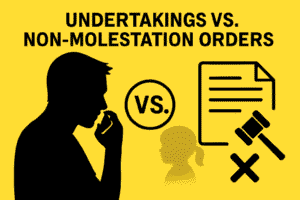If you’ve been stopped from seeing your child, the C100 form is often the first step back into court. For many dads, it feels daunting – pages of legal jargon, a £255+ fee, and the fear of making a mistake that could delay things further.
This guide breaks it down in plain English. You’ll learn what the C100 is, when you need it, how much it costs, and what happens after you file it – plus practical tips on how to give yourself the best chance of success in court.
🔑 Key Takeaways
- The C100 form is used to apply for a Child Arrangements Order, Specific Issue Order, or Prohibited Steps Order under the Children Act 1989.
- Most dads need to attend a MIAM (Mediation Information & Assessment Meeting) before filing.
- The fee is currently £255–£263, though you may qualify for Help With Fees if you’re on a low income or certain benefits.
- Once filed, the court sets a First Hearing (FHDRA) and asks CAFCASS to complete safeguarding checks.
- A well-prepared application and evidence – supported by a Position Statement – can make a huge difference.
👉 If you’re about to file one and want expert guidance, see our dedicated page on C100 Form Support for Dads.
Worried about filing your C100 correctly? Message us on WhatsApp for step-by-step support.
Quick Navigation:
What Is a C100 Form?
The C100 form is the application you use when asking the family court to step in and make decisions about your child under Section 8 of the Children Act 1989.
It can be used for three main orders:
- Child Arrangements Order (CAO): Decides who your child lives with and when they spend time with each parent.
- Specific Issue Order: Resolves a single dispute (e.g. schooling, medical treatment, taking a child abroad).
- Prohibited Steps Order: Prevents the other parent from making certain decisions without permission (e.g. changing schools, moving away).
👉 For a deeper breakdown, see our guide to Child Arrangements Orders.
When Do You Need a C100?
You’ll need a C100 if:
- You and your ex cannot agree on where your child should live or how often you should see them.
- There are disputes over holidays, passports, education, or medical treatment.
- You need an urgent order to prevent your child being moved or kept from you.
In simple terms: the C100 is your route into family court when agreements break down.
How Much Does a C100 Cost?
Money worries are one of the first questions dads ask – filing a C100 isn’t free, and knowing the fee upfront helps you plan.
- The application fee is £255–£263 (as of 2025).
- If you’re on a low income or certain benefits, you may qualify for Help With Fees – check eligibility here.
- This only covers the court fee – you’ll still need to prepare your application, evidence, and possibly legal support.
Do You Need Mediation First?
In most cases, yes. Before you can apply with a C100, you must attend a Mediation Information & Assessment Meeting (MIAM) with a qualified mediator.
At a MIAM, a mediator will:
- Explain how mediation works.
- Assess whether it’s suitable for your case.
- Provide a signed certificate (if mediation fails or isn’t appropriate).
There are exemptions – for example, cases involving domestic abuse, safeguarding concerns, or urgency.
👉 If you’re unsure, read more about our MIAM Mediation Support.
What Happens After Submitting a C100?
Once your form is submitted:
- The court acknowledges the application.
- CAFCASS carries out safeguarding checks (usually within 17 days).
- A First Hearing and Dispute Resolution Appointment (FHDRA) is scheduled.
- At this hearing, the judge decides whether further reports are needed – often a Section 7 Report.
- The process continues until either you reach an agreement or the judge makes a final order.
Once you file, things move fast. WhatsApp us now to make sure you’re fully prepared before CAFCASS calls.
How Long Does It Take?
The family court process is rarely quick. From safeguarding checks to hearings, here’s what to expect in terms of timing.
- Safeguarding checks: usually within 2–3 weeks.
- First hearing (FHDRA): often 4–6 weeks after filing.
- Final decision: may take several months depending on the complexity of your case and court backlog.
How Dads Should Respond
Filing a C100 is just the start. How you handle yourself in the process can make all the difference:
- Cooperate with CAFCASS and the court – avoid appearing obstructive.
- Stay child-focused – show you’re putting your child’s needs first.
- Keep evidence organised – texts, emails, school records, witness statements.
- Prepare a Position Statement – this is your chance to present your side clearly. 👉 See our Position Statement support.
👉 Many dads find this overwhelming – booking a free consultation can give you clarity and a plan.
FAQs
Many dads search the same questions when first hearing about the C100 form. Here are clear answers:
What is the purpose of the C100 form?
It’s the form used to ask the court to make decisions about your child’s arrangements when parents can’t agree.
Do I need a solicitor for a C100?
Not always. You can apply as a “litigant in person,” but professional support can prevent costly mistakes.
How much does it cost to file a C100?
The fee is currently £255–£263, with possible fee reduction through Help With Fees.
Can a C100 be rejected?
Yes, if it’s incomplete or missing the required MIAM certificate (unless you have an exemption).
What happens at the first hearing?
The First Hearing (FHDRA) identifies key issues, considers safeguarding, and decides whether more reports are needed.
How do I respond if my ex files a C100?
You’ll be sent a copy and invited to the first hearing. It’s important to prepare a Position Statement and evidence.
Can you get a C100 without mediation?
Only if you qualify for a MIAM exemption (e.g. domestic abuse, safeguarding concerns, or urgency).
Still have questions about your C100? Get answers instantly on WhatsApp.
Conclusion
The C100 form may look intimidating, but it’s simply the court’s way of getting clear on arrangements for your child. With preparation, evidence, and support, you can give the judge the best chance of seeing your commitment as a father.
For tailored support, visit the Dad’s Consultancy homepage or book a free consultation today.
🧠 Insider Insight: Lach, our founder, is a qualified social worker who used to write Section 7 reports for CAFCASS – the very reports that influence court outcomes. Now he helps dads respond to them. Learn more about Lach’s background.
👉 Need help with your C100 Form? Book your free consultation today




